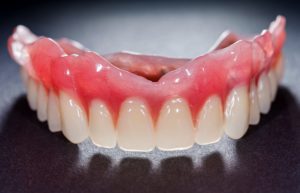 Advancements in technologies and materials have made dentures more realistic than ever. A good set of dentures will fit your mouth like a glove. They’ll rest on top of your gum tissue comfortably while suction holds them in place. Unfortunately, your dentures may not fit the same as the years’ pass. An adhesive can give you added security to keep your pearly whites in place, but not all products are the same. Here are a few things you should know when using denture adhesive.
Advancements in technologies and materials have made dentures more realistic than ever. A good set of dentures will fit your mouth like a glove. They’ll rest on top of your gum tissue comfortably while suction holds them in place. Unfortunately, your dentures may not fit the same as the years’ pass. An adhesive can give you added security to keep your pearly whites in place, but not all products are the same. Here are a few things you should know when using denture adhesive.
Who Can Benefit from an Adhesive?
A denture adhesive is a great option to keep your teeth in place; however, it’s not intended to be used as a long-term solution. The Cleveland Clinic recommends an adhesive for patients needing help with:
- Better sense of comfort for improved confidence
- Dry mouth caused by certain medications or medical conditions
- Stronger hold for prolonged speaking, like teachers or singers
It’s normal for your dentures to lose their fit because your mouth changes shape over time. Since your dentures can’t adapt to these changes, it can cause slipping or irritation. Your dentist can perform the adjustments or replacements necessary to restore a comfortable fit.
It’s best to avoid using an adhesive if you have:
- Poor oral hygiene
- Allergic to ingredients
- Poorly fitting dentures
- Using more adhesive to maintain a good fit
Using the Right Denture Adhesive
You have many adhesives to choose from, which come in various forms, like strips, gels, or powders. You may need to try a few to find the best one for you. No matter the product, look for those that don’t contain any zinc.
Once you’re ready to give your new adhesive a try, clean your dentures and gums well. Follow the product’s instructions when applying the adhesive to your dentures before placing them in your mouth. Position them immediately and hold them in place for a few seconds.
It can take practice to find the right amount of adhesive to use. If you have any overflow, you’re using too much. Generally, 2.4 ounces should last for 7 to 8 weeks. You’ll enjoy an all-day hold to make sure your smile doesn’t slip.
If you start to rely on an adhesive, it’s time to contact your dentist for an appointment. Your denture may need to be relined or replaced.
Stabilize Your Smile Today
Your dentist has the solutions you need to stop slipping and irritation. If you’re ready to benefit from unmatched support and stability, ask your dentist about adding dental implants to your treatment plan. They’ll create the high-quality, attractive denture you need to enjoy the next best thing to your real teeth.
About Dr. Robert L. Viventi
Dr. Viventi achieved his dental degree from Tufts University and has regularly continued his education in advanced services, like restorative and implant dentistry. He provides modern services to help his patients achieve their best smiles. If your dentures are slipping or you’re ready for dental implants, contact our office today to request your consultation.
